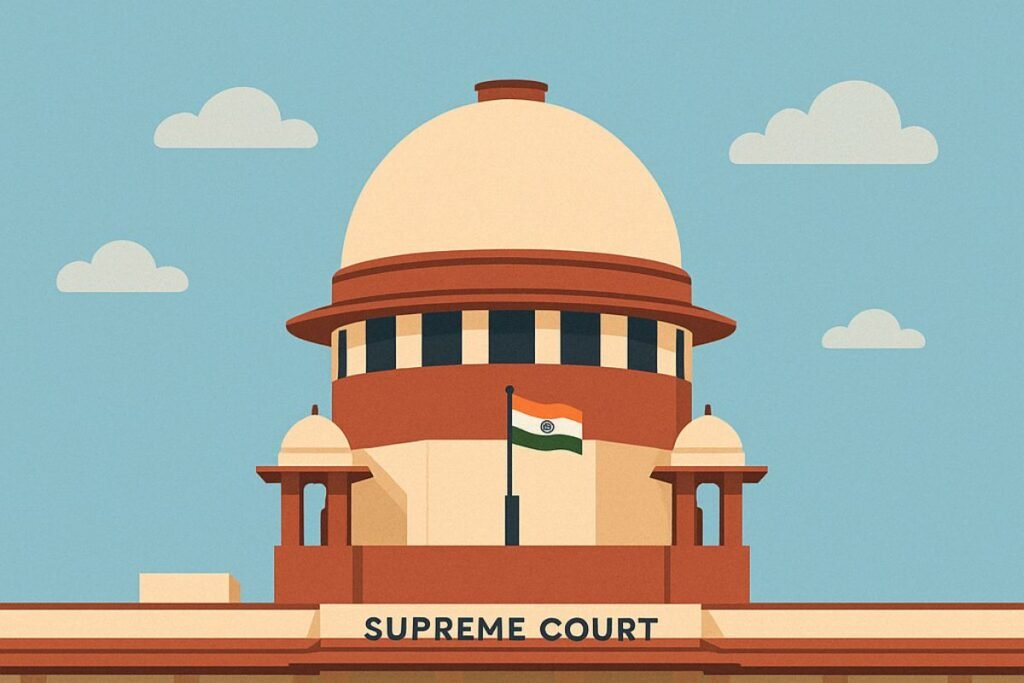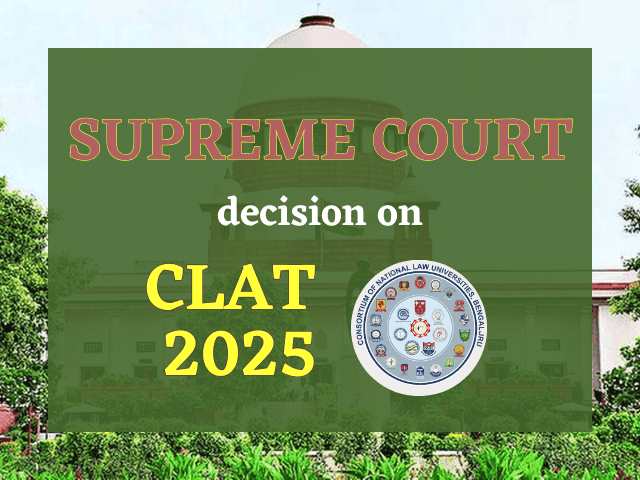
CLAT 2025 Merit List Dispute: Supreme Court Stays Delhi HC’s Directive
Date of SC Order: April 2025
Bench: Justice B.R. Gavai & Justice A.G. Masih
Matter: Challenge to the Delhi HC directive to revise CLAT-UG 2025 merit list
Background of the Case
- CLAT-UG 2025 Exam Details:
- Conducted on December 1, 2024 by the Consortium of National Law Universities (CNLU).
- Results were announced on December 7, 2024.
- The exam is a national-level law entrance test for undergraduate programs in 24 NLUs across India.
- Objections Raised Post-Result:
- Multiple candidates filed legal petitions challenging errors in the CLAT question paper.
- Four questions were contested:
- Some were alleged to be out of syllabus.
- Others were claimed to have palpably incorrect answers.
- The Delhi High Court acknowledged these objections and directed corrections in the evaluation process.
Delhi High Court’s Directive (April 23, 2025):
- Key Points of the HC Order:
- CNLU was instructed to:
- Revise the mark sheets of affected candidates.
- Republish the final merit list within four weeks.
- The judgment was based on the Court’s observation that certain questions did not conform to the standard required and prejudiced candidates’ scores.
- CNLU was instructed to:
- Impact of HC Order:
- Triggered a major shift in the admission process timeline.
- Created a legal obligation on the Consortium to revise and redistribute results.
Supreme Court’s Interim Intervention:
- Special Leave Petition (SLP):
- The Consortium of NLUs filed an SLP in the Supreme Court, challenging the Delhi High Court’s ruling.
- Cited procedural concerns and possible disruptions in the ongoing admission process.
- SC Bench & Interim Order:
- A two-judge Bench comprising Justice B.R. Gavai and Justice A.G. Masih issued a stay on the Delhi HC directive.
- This means that, for now, the Consortium is not required to revise the merit list or mark sheets.
- Notice Issued:
- The Supreme Court has issued notice to the respondents (including the original petitioners in the HC).
- Final decision pending, further hearings expected.
Implications for CLAT Aspirants
- Uncertainty for Students:
- Students awaiting a revised merit list now face uncertainty regarding their final rank and admission status.
- Some students who would have potentially benefited from the High Court’s directive are now left in limbo.
- Temporary Relief for the Consortium:
- The SC’s stay order offers the Consortium temporary legal relief from the obligation of reprocessing results.
- Helps maintain the status quo until further legal clarity is achieved.
- Legal Proceedings Continue:
- The Supreme Court’s stay is interim in nature—meaning it does not quash the HC ruling but suspends its enforcement until a final verdict.
- Stakeholders must stay tuned for further orders and final judgment from the apex court.
Legal and Administrative Significance
- Judicial Oversight of Competitive Exams:
- This case highlights the role of judiciary in maintaining fairness in national-level entrance tests.
- Reinforces the principle that students have the right to challenge flawed evaluation mechanisms.
- Balance Between Speed and Fairness:
- Courts must strike a balance between timely admissions and ensuring just and error-free assessments.
- This case showcases the complexity of managing large-scale entrance exams under legal scrutiny.
Key Takeaway for CLAT 2026 Aspirants:
- This is a live example of legal reasoning, judicial review, and procedural fairness—all core elements of the CLAT syllabus.
- Aspirants should closely observe how courts handle exam-related disputes, as such cases shape policy reforms and judicial precedent for entrance exams in India.
- Maintain awareness of current affairs in the legal education sector and understand the importance of constitutional remedies and administrative accountability.
Note
Powered by CLAT Gurukul — India’s Premier Law Entrance Coaching Institute
At CLAT Gurukul, we don’t just help you crack CLAT — we help you conquer it. This article is part of our mission to empower future legal professionals with relevant insights, in-depth analysis, and exam-oriented strategies that truly make a difference.
Why Thousands of Aspirants Trust CLAT Gurukul:
- Personalized mentorship by India’s top CLAT educators
- Comprehensive study material, updated daily
- Smart strategy sessions, mock tests, and performance analytics
- A proven track record of NLU selections year after year
Whether you’re a beginner or a repeater, you’re already one step ahead with CLAT Gurukul by your side.
Join our community of toppers. Visit www.clatgurukul.in or
connect with us on WhatsApp at +91-7033006444 for guidance and free counseling.
This Blog is Powered by CLAT Gurukul — India’s Leading Law Entrance Prep Platform
At CLAT Gurukul, we believe in empowering future legal minds with the right blend of knowledge, strategy, and mentorship. This blog is a reflection of our commitment to quality content that not only helps aspirants stay updated but also sharpens their conceptual clarity.
Why CLAT Gurukul?
- Personalized Mentorship by Top Legal Educators
- Comprehensive Study Materials & Legal Updates
- Daily Practice Sets, Mocks & Performance Tracking
- Result-Oriented Strategy for CLAT, AILET, and CUET
Whether you’re reading this article to deepen your understanding or to stay ahead in your exam prep — you’re already one step closer with CLAT Gurukul by your side.
Join thousands of successful aspirants who trusted CLAT Gurukul and cracked India’s top law entrance exams.
Visit www.clatgurukul.in to learn more or speak to our experts now!




